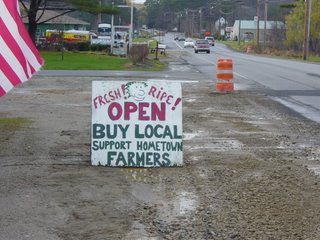We are in another election period. Three days from now, some of us will march to the polls and cast our votes, hopeful that they’ll even be counted correctly. That, in itself, is problematic. In my own state of Maine, the secretary of state is predicting a voter turnout of somewhere in the range of 45 to 55 percent—this during a crucial midterm election at the national level, with Maine choosing a governor, local representatives to Augusta and determining whether or not we care to gut our public services by passing TABOR, the “slash and burn” attempt at controlling taxes, given to us courtesy of our friends on the right-wing fringe.
Our current president, a man who won two elections under dubious voting circumstances, fraught with polling irregularities, spends a lot of time talking about democracy, his focus often on other parts of the world to the exclusion of his own banana republic. In a country that some would hold up as the shining “city on a hill” when it comes to how representative government should work, half of us don’t vote, with a good portion of the other 50 percent not sure that Tuesday’s process will be legitimate. As Jeffrey Kopstein and Mark Lipback write, in their book,
Comparative Politics: Interests, Identities and Institutions in a Changing Global Order,
“Democracies sometimes violate their own laws or conduct elections that are not perfectly free and fair. Beyond a certain point, however, it makes little sense to categorize a country as democratic if it prohibits free speech or falsifies election
results.”Back in 2004, those who did vote (or could vote), regardless of the candidate you voted for (or thought you voted for), the election didn’t seem right. After four years of fractious rankling and with an unpopular war raging in Iraq, Americans went to the polls, with pundits insisting that voters were determined to express their dissatisfaction with Bush and the Republicans. Strangely, the usually discombobulated Democrats, the “gang who couldn’t shoot straight,” as I like to call them, were strangely unified. They’d united around the “electable” candidate, the former Vietnam veteran and longtime Senator, John Kerry, and urged everyone within earshot that we should vote for “anybody but Bush.” Even the perennial third party rabble-rouser, Ralph Nader, garnered almost no support (0.38 percent of the national vote), yet, when the smoke settled and the votes were counted (or not counted), George W. Bush was standing tall, reelected as our 43rd president. In fact, unlike the chad-shrouded election of 2000, this one wasn’t even close, with GWB winning with a 3 million vote cushion.
Strangely, despite voters being forced to stand in line for hours in Ohio, polls closing before voters got to vote, exit polls favoring Kerry (in Ohio) turned on their heads, there was very little national attention focused on the specter that the 2004 election, like the 2000 election, was stolen. Other than a few lone voices like
Mark Crispin Miller, Keith Olbermann and even
Randi Rhodes, of
Air America, most of the media moved on, ready to talk about Republican mandates and Mr. Bush’s conservative capital to spend. In fact, Mr. Bush, one of the more intellectually challenged presidents to ever hold office, began running about the country, as well as at the mouth, insisting that the voters had given him a clear message that his disastrous “war on terrah,” civil liberty infringements and wealth transfer programs were wildly popular.
So, what’s the answer? To be quite honest, I don’t really have one. As person who no longer has faith in the tired ideal of, “one person, one vote,” I’ll go to the polls, more out of conditioning than any great optimism. I’ll cast my vote and then, I’ll come home and watch the returns stream in. I’ll tolerate the prattle from tired commentators, rattling off results from states like Oregon, Montana and Utah. They’ll gush about certain “stars” of the political pantheon and devote some coverage to key races, but absent from any of their corporately-controlled patter, will be a mention that the whole goddamn system is fucked beyond our control!
Just this past week, John Kerry, the man I voted for in 2004, made a comment about Iraq that put him in a world of hurt, or as Bobby Boucher (from
The Waterboy) would say, he opened up “a can of whupass.” I don't dislike John Kerry. Oh, at times, he pisses me off, with his air of nobility and, like Al Gore, his penchant for letting political handlers so obscure the real candidate that both of these decent men, come off as totally inept and ultimately, ineffective.
Kerry dared to make a statement before college students in Southern California that got characterized later, as a bad joke. What got missed by everyone, except good ole’
Keith Olbermann, a former sportscaster from
ESPN, was that Kerry, in essence, was calling the president, stupid (Christ, there's a new revelation). Instead, the Bush sycophants and members of the press (are those two one and the same?), turned Kerry’s statement into a case of insult against our good boys in Iraq. Before all was said and done, Kerry, regardless of how you feel about him as presidential material, a man of honor and integrity, ended up having to “fall on his sword” at the insistence of the spineless Democrats in control, virtually extinguishing any hopes of a presidential run for himself, in 2008. Kerry, who guided men through battle and then had the integrity to come home and take a stand for veterans, which, as a child of privilege, would have been easy to have shirked, ends up looking like the lesser of a person in another head-to-head with George W. Bush.
I cannot explain how a man, with obvious pathological predispositions towards dishonesty, who never served a day in combat, in fact, criminally left his responsibilities to occupy a politically-arranged substitute for real service, continues to be given a free pass? Either the American people are too stupid, too callow, or they don’t have what it takes to live in a country that was intended to be a democracy.
While conservatives love to quibble over definitions, insisting our nation is actually a "constitutional republic," we are in fact, a democracy, a representative one, evident in each one of our various branches. Maybe that aversion to the term among conservatives is somewhat instructive? By denying the term, but even more important, by denying the mechanisms, the current conservative clusterfuck is doing all in its power to deny the very foundations and underpinnings that date back over 200 years.
Unlike many progressives and left-leaning hipsters, I don’t entertain any illusions that a Democratic majority in the House, or Senate, or both, is going to change the collision course that America is on. The Democrats aren’t going to overhaul the tax code, or suddenly defund the military, or enact anything close to the radical changes (universal healthcare) that would make me happy. However, just a slight swerve back to the center would be a cool drop of water for even a cynical left-leaning libertarian, like me. It would halt this continual rightward, theocratic stumble towards fascism that we are on and if nothing else, gives me some slight glimmer of hope that we might rid ourselves, eventually, of some of the loathsome bottom-feeders that we are currently saddled with in Washington.
Driving home last night, I was listening to
NPR and heard a story about the D-word subject that I’ve gone on about much longer than I intended. The theme of the piece was the U.S. policy of promoting democracy around the world, particularly in Arab countries and whether or not these countries are well-served with democratic forms of government. In fact, it was quite interesting when they talked about Hamas, recently brought to power in Palestine, in a democratically-held election. The reporter made the point that while we want democracy in other parts of the world, we are disappointed when a leader, or in the case of Hamas, a party is a elected that we don’t want—the wrong candidate, so to speak. Ironically, one of the so-called “experts” that they talked to was none other than Newt Gingrich, which ultimately led me to ranting like a crazy man at my radio and ultimately, shoving in my mix tape of
Centro-matic to prevent my head from exploding.
Come Tuesday, I’ll drag myself to my Durham polling station. I’ll vote for governor, against TABOR, choose my local representatives, as well as senator and representative to Washington. We actually still have paper ballots that you feed into a machine on your way out, which will be counted by one of my fellow townspeople. My wife, Mary, has counted on election night before. If nothing else, I can at least be assured that my vote is counted, which won’t be the case in many other parts of the country. You see, if you are voting on a Diebold machine, or one of the four machines owned by rabid, right-wing Republicans, which leave no paper trail, then you can’t be sure that the vote you cast is actually counted for the candidate you chose.
Since those who
count the votes, ultimately are the ones who win, then Republicans have a real advantage, at the present time. If Democrats can do nothing more than regain control of the House and Senate, they’ll be able to feel good on Tuesday night. Simply being able to fix the broken system of elections that exist right here in our own country will be one huge step back towards legitimacy. Then, I can start wishing again, for something miraculous, like instant runoff voting, or god forbid, a viable movement to elect a third party candidate that represented the needs of all Americans, not just the wealthy. Hey, a man can dream, can’t he?









